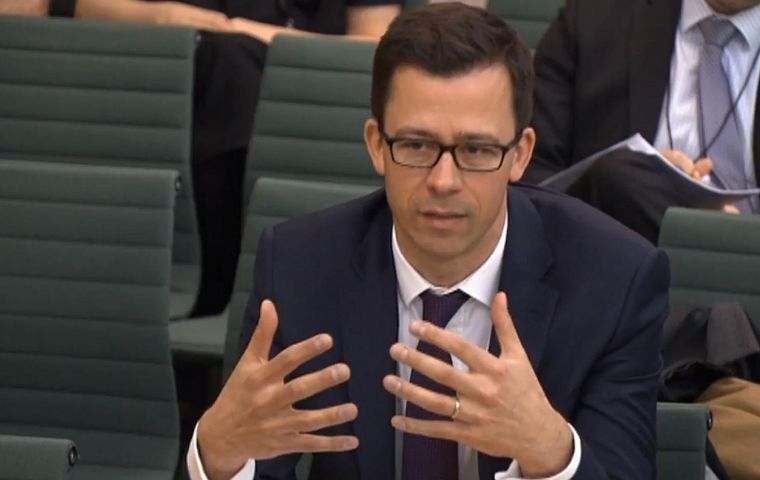MercoPress. South Atlantic News Agency
Brexit has cost UK economy some £80 billion since the 2016 vote, says BoE policymaker
 Gertjan Vlieghe, an external member of the central bank’s Monetary Policy Committee, said that, since the June 2016 vote, 2% has been shaved off GDP
Gertjan Vlieghe, an external member of the central bank’s Monetary Policy Committee, said that, since the June 2016 vote, 2% has been shaved off GDP Brexit has cost the British economy at least £80 billion since the referendum and the shock of a no-deal divorce could see interest rates slashed, according to a Bank of England policymaker. Gertjan Vlieghe, an external member of the central bank’s Monetary Policy Committee, said that, since the June 2016 vote, 2% has been shaved off GDP.
This, he said, amounts to a loss of around £800 million per week, or £40 billion per year.
“The analysis suggests that since the vote in June 2016, we have lost 2% of GDP relative to a scenario where there had been no significant domestic economic events. That amounts to around £40 billion per year, or £800 million per week of lost income for the country as a whole,” he told an audience in London.
The rate-setter pointed to a collapse in business investment into the UK, which has been stuck at zero, while in G7 peers it has accelerated to 6% a year.
“Firms have been saying in a number of surveys that the uncertainty about our future relationship with the EU is a source of concern for them that has been weighing on their investment spending, as plans for expansion have, on average, been scaled back,” Mr Vlieghe said.
Labour MP Owen Smith described the figures as “eye-wateringly high”, and warned that the NHS will suffer as a result. “Damaging our economy makes addressing these problems harder, not easier. It means less money for the NHS and our other national priorities.
“This is a vivid and painful reminder that the promises of Brexit are not being – and cannot be – delivered.”
Mr Vlieghe also warned that interest rates are more likely to be cut than hiked if Britain crashes out of the European Union without a deal. “In the case of a no-deal scenario, I judge that an easing or an extended pause in monetary policy is more likely to be the appropriate policy response than a tightening.”
His comments come with just over a month to go before Britain’s departure from the bloc on March 29 and with Parliament in a deadlock over Brexit, having rejected Prime Minister Theresa May’s deal.
Last week, the Bank slashed its growth forecast for the economy and warned about the mounting risk of a recession in the event of a no-deal Brexit.




Top Comments
Disclaimer & comment rules-

Read all commentsA round of applause for the English majority....
Feb 18th, 2019 - 01:19 am 0Commenting for this story is now closed.
If you have a Facebook account, become a fan and comment on our Facebook Page!